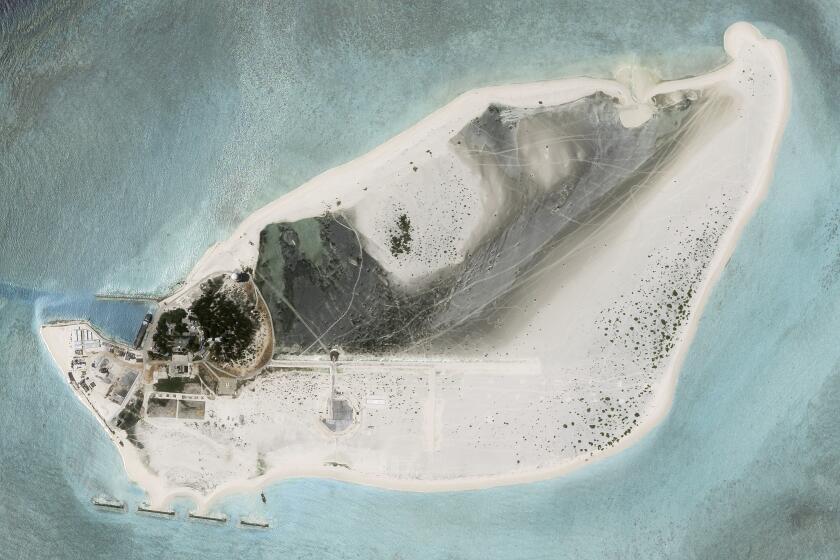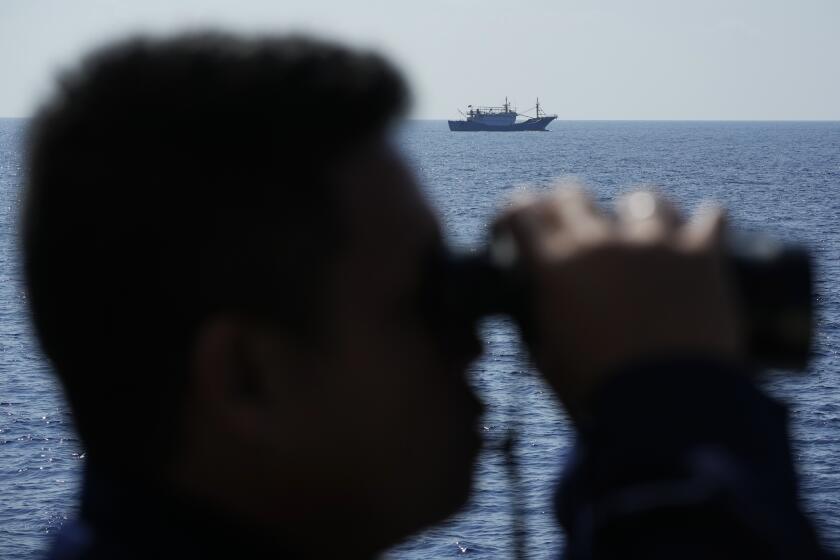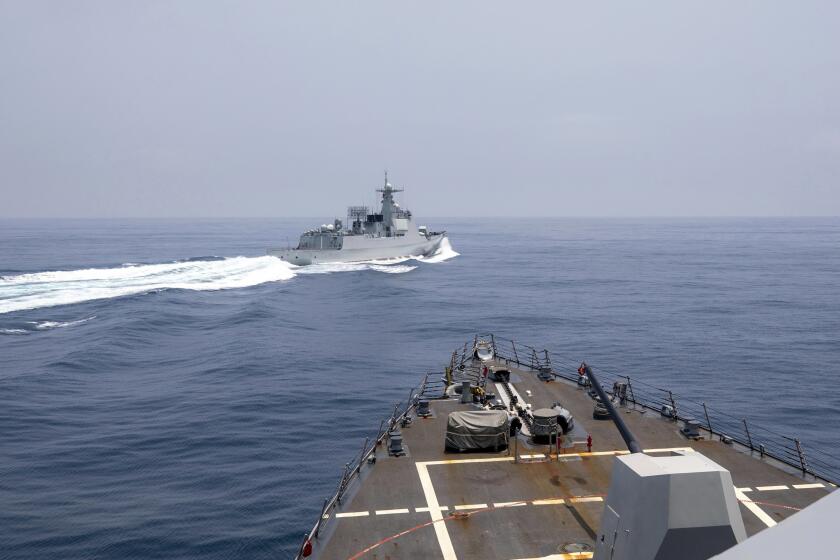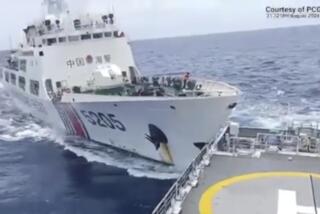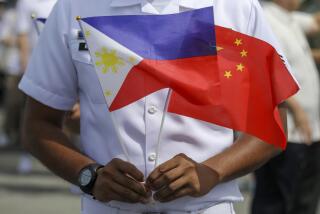In risky move, Philippine supply boats breach Chinese blockade in South China Sea
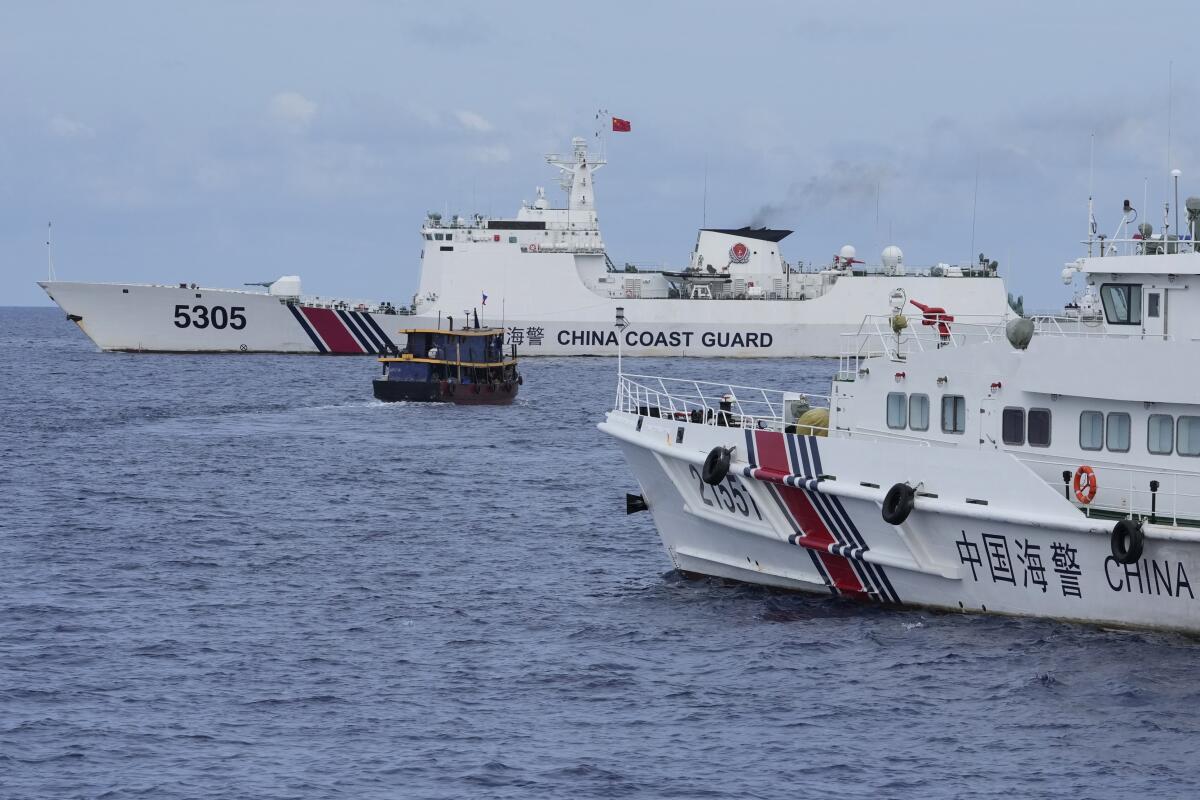
- Share via
ABOARD BRP CABRA — As a U.S. Navy plane circled overhead, two Philippine boats breached a Chinese coast guard blockade in a dangerous confrontation Tuesday in the disputed South China Sea to deliver food and other supplies to Philippine forces guarding a contested shoal.
Two Philippine coast guard vessels escorting the supply boats, however, were blocked by at least four Chinese coast guard ships for about five hours in the tense standoff near Second Thomas Shoal.
The dangerous encounter is the latest flare-up of the long-seething territorial disputes in the busy sea that involve China, the Philippines, Vietnam, Malaysia, Taiwan and Brunei. It’s regarded as an Asian flashpoint and has become a delicate fault line in the U.S.-China rivalry.
The Philippine coast guard invited a small group of journalists, including two from the Associated Press, to join the ships that secured the supply boats as part of a new strategy aimed at exposing China’s increasingly aggressive actions in the South China Sea, which Beijing claims virtually in its entirety.
One Chinese coast guard ship came as close as 50 yards as it crossed the bow of BRP Cabra to block the Philippine coast guard ship, which maneuvered fast to avoid a collision, said a coast guard officer on board the Cabra, who could not be named because of official policy.
The Cabra and another coast guard ship, the BRP Sindangan, were surrounded by four Chinese coast guard ships and four suspected militia vessels and forced to stop as the other two Philippine boats delivered supplies to the Philippine forces at Second Thomas Shoal, more than four miles away.
Satellite photos analyzed by the Associated Press appear to show China is constructing an airstrip on an island also claimed by Vietnam and Taiwan.
All the Philippine vessels sailed away without further incident after the supplies and a fresh crew of sailors were delivered to the military outpost on a long-marooned Philippine navy ship at the shoal.
“We’re happy that the resupply mission succeeded despite all the dangerous blockings and other actions,” Cmdr. Emmanuel Dangate of the Cabra told AP.
Coast guard spokesperson Commodore Jay Tarriela condemned the Chinese coast guard blockade and other perilous maneuvers as a violation of international regulations aimed at avoiding collisions at sea. The Philippine coast guard will provide a report to the Department of Foreign Affairs in Manila for a possible diplomatic protest against China, he said.
The hostilities started Monday night, when a Chinese coast guard ship started tailing the Philippine vessels. On Tuesday morning, both sides asserted their territorial rights in a flurry of radio message exchanges with a man identifying himself as coming from one of the Chinese coast guard ships, warning at one point: “To avoid miscalculation, leave and keep out. Otherwise, you will bear full responsibility for all the consequences.”
A ‘ride-along’ with the Philippine coast guard reveals tense cat-and-mouse games with China in one of the world’s most fiercely contested seas.
When the Philippine ships did not back away, the Chinese radio caller warned that, because of such continued “infringement and provocation, we will take countermeasures.”
Chinese coast guard ships repeatedly crossed the bows of the two Philippine coast guard ships at close range. Up to three later positioned in front of the Cabra, which remained stationary. The Chinese ships also moved dangerously close to the wooden-hulled supply boats, but the two smaller vessels managed to dart cross the shallows toward the shoal.
Chinese officials at the embassy in Manila did not immediately comment on the encounter. It was not immediately clear why the U.S. Navy deployed the surveillance plane that flew overhead for more than three hours as the Chinese ships blocked and shadowed the Philippine vessels off Second Thomas Shoal.
When asked about the deployment of the Navy plane, U.S. Embassy spokesperson Kanishka Gangopadhyay in Manila said he could not provide specifics. “What I can say is that all of our military activities in the Philippines are conducted in full coordination with our Philippine allies,” he said.
The U.S. says a Chinese navy ship cut in front of an American destroyer in the Taiwan Strait, forcing the destroyer to slow down to avoid a collision.
Philippine security officials have said they’ve received intelligence information and surveillance images taken in the disputed waters from their U.S. and other foreign counterparts in the past as part of security cooperation.
The U.S. lays no claim to the South China Sea but has declared that freedom of navigation and flight, as well as peacefully resolving disputes, are in its national interest.
After a Chinese coast guard ship used a water cannon against a Philippine supply boat Aug. 5, Washington renewed a warning that it’s obligated to defend its longtime treaty ally if Philippine forces, aircraft and vessels come under an armed attack, including in the South China Sea.
More to Read
Sign up for Essential California
The most important California stories and recommendations in your inbox every morning.
You may occasionally receive promotional content from the Los Angeles Times.
